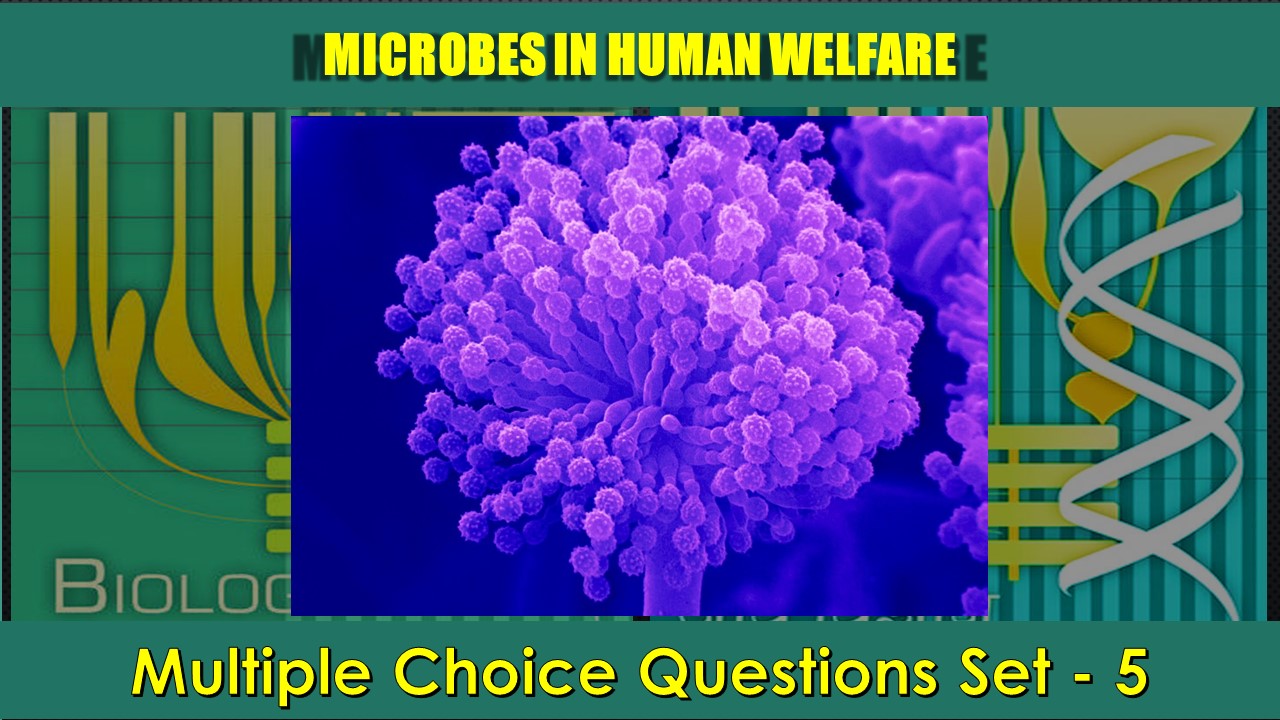CBSE Class 12 Microbes in Human Welfare Multiple Choice Questions with Answers. MCQ Questions Class 12 Microbes in Human Welfare with Answers Is Prepared Based on Latest Exam Pattern. Students can solve NCERT MCQ questions Class 12 Microbes in Human Welfare with Answers to know their preparation level.
Students who are searching for NCERT MCQ Questions Class 12 Microbes in Human Welfare with Answers are compiled here to get good practice on all fundamentals. Know your preparation level on MCQ Questions for Class 12 Microbes in Human Welfare with Answers. You can also verify your answers from the provided MCQ Class 12 Microbes in Human Welfare with Answers. So, ace up your preparation with MCQ of Class 12 Biology Examinations.
MCQ Questions Class 12 Microbes in Human Welfare with Answers - Set - 5
Question 1:
Gobar gas contains mainly
(a) CO2 + H2
(b) CO2 + H2O
(c) CH4 only
(d) CH4 + CO2
Correct Answer – (D)
Question 2:
The guts of cow and buffalo possess
(a) methanogens
(b) cyanobacteria
(c) Fucus sp.
(d) Chlorella sp
Correct Answer – (A)
Question 3:
Which of the following is put into anaerobic sludge digester for further sewage treatment?
(a) Primary sludge
(b) Floating debris
(c) Effluents of primary treatment
(d) Activated sludge
Correct Answer – (D)
Question 4:
Which of the following microorganisms is used for production of citric acid in industries?
(a) Aspergillus niger
(b) Rhizopus nigricans
(c) Lactobacillus bulgaris
(d) Penicillium citrinum
Correct Answer – (A)
Question 5:
Which one of the following is a wrong matching of a microbe and its industrial product, while the remaining three are correct?
(a) Yeast – Statins
(b) Acetobacter aceti – Acetic acid
(c) Clostridium butylicum – Lactic acid
(d) Aspergillus niger – Citric acid
Correct Answer – (C)
MCQ Questions Class 12 Microbes in Human Welfare With Answers
Question 6:
Select the correct statement from the following.
(a) Biogas is produced by the activity of aerobic bacteria on animal waste.
(b) Methanobacterium is an aerobic bacterium found in rumen of cattle.
(c) Biogas, commonly called gobar gas, is pure methane.
(d) Activated sludge-sediment in settlement tanks of sewage treatment plant is a rich source of aerobic bacteria.
Correct Answer – (D)
Question 7:
The domestic sewage in large cities
(a) has a high BOD as it contains both aerobic and anaerobic bacteria
(b) is processed by aerobic and then anaerobic bacteria in the secondary treatment in Sewage Treatment Plants (STPs)
(c) when treated in STPs does not really require the aeration step as the sewage contains adequate oxygen
(d) has very high amount of suspended solids and dissolved salts.
Correct Answer – (B)
Question 8:
The citric acid is produced by
(a) Candida utilis
(b) Azotobacter suboxydans
(c) Aspergillus niger
(d) Streptococcus lactis.
Correct Answer – (C)
Question 9:
Which of the following is used to manufacture ethanol from starch?
(a) Penicillium
(b) Saccharomyces
(c) Azotobacter
(d) Lactobacillus
Correct Answer – (B)
Question 10:
The most common substrate used in distilleries for the production of ethanol is
(a) corn meal
(b) soya meal
(c) ground gram
(d) molasses.
Correct Answer – (D)
- NCERT Solutions Class 11 Chemistry Chapter 1 : Some Basic Concepts of Chemistry
- NCERT Solutions Class 11 Chemistry Chapter 2 : Structure Of The Atom
- NCERT Solutions Class 11 Chemistry Chapter 3 : Classification of Elements and Periodicity in Properties
- NCERT Solutions Class 11 Chemistry Chapter 4 : Chemical Bonding and Molecular Structure
- NCERT Solutions Class 11 Chemistry Chapter 5 : States of Matter
- NCERT Solutions Class 11 Chemistry Chapter 6 : Thermodynamics
- NCERT Solutions Class 11 Chemistry Chapter 7 : Equilibrium
- NCERT Solutions Class 11 Chemistry Chapter 8 : Redox Reactions
- NCERT Solutions Class 11 Chemistry Chapter 9 : Hydrogen
- NCERT Solutions Class 11 Chemistry Chapter 10 : The s-Block Elements
- NCERT Solutions Class 11 Chemistry Chapter 11 : The p-Block Elements
- NCERT Solutions Class 11 Chemistry Chapter 12 : Organic Chemistry: Some Basic Principles and Techniques
- NCERT Solutions Class 11 Chemistry Chapter 13 : Hydrocarbons
- NCERT Solutions Class 11 Chemistry Chapter 14 : Environmental Chemistry




